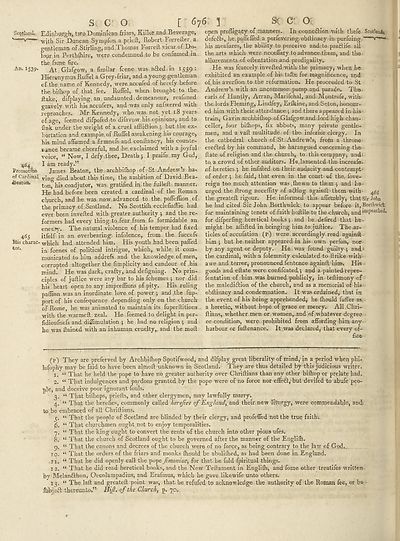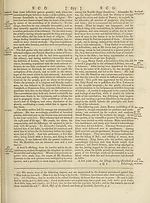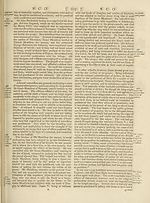Encyclopaedia Britannica, or, a Dictionary of arts, sciences, and miscellaneous literature : enlarged and improved. Illustrated with nearly six hundred engravings > Volume 18, RHI-SCR
(714) Page 676
Download files
Complete book:
Individual page:
Thumbnail gallery: Grid view | List view

SCO [ 676 ] Si O' o
Scotland. Edinburgh, two Dominican ftiars, Killor and Beverage,
y—gjr j)uncan Sympfon a prieft, Robert Fprreller a
gentleman of Stirling, and Thomas Forrefl vicar of Do¬
lour in Perthlhire, were condemned to be confumed in
the fame fire.
An. 1539. At Qlafgow, a fimilar fcene was a£l;ed in 1539:
Fliergnymus Ruffel a Grey-friar, and a young gentleman
of. the name of Kennedy, were aceufed of herefy before
the bithop of that fee. Ruffel, when brought to the
flake, difplaying an undaunted demeanour, reafoned
gravely with his accufers, and Avas only anfwered with
reproaches. IVTr Kennedy, who was not yet 18 years
of age, feemed difpofed to difavow his opinions, and to
fink under the weight of a cruel affliction ; but the ex¬
hortation and example of RufTel awakening his courage,
his mind afiumed a firmnefs and conftancy, his counte¬
nance became cheerful, and he exclaimed with a joy ful
voice, “ Now, I defy thee. Death ; I praife my God,
-464 I am ready.”
Promotion James Beaton, the archbifhop of St Andrew’s ha-
of Cardinal v;ncr died about this time, the ambition of David Bea-
&eaton. ton^ ^ coadjutor, was gratified in the fulleft manner.
He had before been created a cardinal of the Roman
church, and he was now advanced to the pofTeffion of
the primacy of Scotland. No Scottifh ecclefiaftic had
ever been invefted with greater authority ; and the re¬
formers had every thing to fear from fo formidable an
enenty. The natural violence of his temper had fixed
465 itfelf in an overbearing- infolence, from the fuccefs
His charac- which had attended him. His youth had been palled
ter*- in fcenes of political intrigue, which, while it com¬
municated to him addrefs and the knowledge of men,
corrupted altogether the fimplicity and candour of his
mind. He was dark, crafty, and defigning. No prin¬
ciples of juftice were any bar to his fchemes ; nor did
his heart open to any impreffions of pity. His ruling
paflion was an inordinate love of power ; and the fup-
port of his confequence depending only on the church
of Rome, he was animated to maintain its fuperftitions
with the warmed zeal. He feemed to delight in per-
fidioufnefs and diflimulation ; he had no religion ; and
he was ftained with an inhuman cruelty,, and the mod
open profligacy of manners. In connexion with thefe Scotka*,
defers, he.pofffclTed a perfevering, obdinacy in purfuing ""“"v
his meafures, the ability to perceive and to praftife all
the arts which were neceffary to advance them, and the
allurements of odentation and prodigality.
He was fcarcely inveded with the primacy, when he
exhibited an example of his tafte for magnificence, and
of his averfion to the reformation. He proceeded to St
Andrew’s with an uncommon pomp and parade*. The
earls of Huntly, Arran, Marifchal, and Montrofe, with
the lords Fleming, Lindfey, Erlkine, and Seton, honour¬
ed him with their attendance ; and there appeared in his-
train, Gavin archbilhop of Glafgow and lord high chan¬
cellor, four bilhops, fix abbots, many private gentle¬
men, and a vad multitude of the inferior clergy. In
the cathedral church of St Andrew’s, from a throne
erected by his command, he harangued concerning the
date of religion and the church, to this company, and*
to a crowd of other auditors. He lamented the increafe.
of heretics ; he infided on their audacity and contempt
of order ; he faid, that even in the court of the fove-
reign too much attention was (hewn to them ; and he
urged the drong neceflity of aiding againd them with- ^
the greated rigour. He informed this afiembly, that Sir John
he had cited Sir John Borthwick to appear before it, Borthwick
for maintaining tenets of faith hodile to the church, and *mPeac'lc^
for difperfing heretical books ; and he defired that he-
might be aflided in bringing him to judice. The ar¬
ticles of accufation (p) were accordingly read againd
him ; but he neither appeared in his own perfon, nor
by any agent or deputy. He was found guilty ; and.;
the cardinal, with a folemnity calculated to drike with
awe and terror, pronounced fentence againd him. His
goods and edate were confifcated ; and a painted repre-
fentation of him was burned publicly, in tedimony of
the malediftion of the church, and as a memorial of his
obdinacy and condemnation. It was ordained, that in
the event of his being apprehended, he Ihould fufl'er as
a heretic, without hope of grace or mercy.- All Chri-
dians, whether men or women, and of whatever degree
or condition, were prohibited from affording him any
harbour or fudenance. It was declared, that every of¬
fice
(p) They are preferved by Archbifhop Spotifwood, and difplay great liberality of mind, in a period when phl-
lofophy may be faid to have been almod unknown in Scotland. They are thus detailed by this judicious writer.
1. “ That he held the pope to have no greater authority over Chridians than any other bifhop or prelate had.
2. “ That indulgences and pardons granted by the pope were of no force nor effeid, but devifed to abufe peo¬
ple, and deceive poor ignorant fouls.
3. “ That bifhops, prieds, and other clergymen, may lawfully marry.
4. “ That the herefie% commonly called herejies of England, and their new liturgy, were commendable, and
$0 be embraced of all Chridians.
r. “ That the people of Scotland are blinded by their clergy, and profeffed not the true faith..
0, “ That churchmen ought not to enjoy temporalities.
7. “ That the king ought to convert the rents of the church into other pious ufes.
8. “ That the church of Scotland ought to be governed after the manner of the Englifli.
f}. “ That the canons and decrees of the church were of no force,, as being contrary to the law of God.
jo. “ That the orders of the friars and monks (hould be abolifhed, as had been done in England.
11. “ That he did openly call the pope fmomac, for that he fold fpiritual things.
12. “ That he did read heretical books, and the New Tedament in Englifh, and fome other treatifes written
by Melan&hon, Oecolampadius, and Eraftnus, which he gave likewife unto others.
13. “ The lad and greated point was, that he refufed to acknowledge the authority of the Roman fee, or bs
Jubjeft thereunto.” Hi/?, of the Church, p. 70, .
Scotland. Edinburgh, two Dominican ftiars, Killor and Beverage,
y—gjr j)uncan Sympfon a prieft, Robert Fprreller a
gentleman of Stirling, and Thomas Forrefl vicar of Do¬
lour in Perthlhire, were condemned to be confumed in
the fame fire.
An. 1539. At Qlafgow, a fimilar fcene was a£l;ed in 1539:
Fliergnymus Ruffel a Grey-friar, and a young gentleman
of. the name of Kennedy, were aceufed of herefy before
the bithop of that fee. Ruffel, when brought to the
flake, difplaying an undaunted demeanour, reafoned
gravely with his accufers, and Avas only anfwered with
reproaches. IVTr Kennedy, who was not yet 18 years
of age, feemed difpofed to difavow his opinions, and to
fink under the weight of a cruel affliction ; but the ex¬
hortation and example of RufTel awakening his courage,
his mind afiumed a firmnefs and conftancy, his counte¬
nance became cheerful, and he exclaimed with a joy ful
voice, “ Now, I defy thee. Death ; I praife my God,
-464 I am ready.”
Promotion James Beaton, the archbifhop of St Andrew’s ha-
of Cardinal v;ncr died about this time, the ambition of David Bea-
&eaton. ton^ ^ coadjutor, was gratified in the fulleft manner.
He had before been created a cardinal of the Roman
church, and he was now advanced to the pofTeffion of
the primacy of Scotland. No Scottifh ecclefiaftic had
ever been invefted with greater authority ; and the re¬
formers had every thing to fear from fo formidable an
enenty. The natural violence of his temper had fixed
465 itfelf in an overbearing- infolence, from the fuccefs
His charac- which had attended him. His youth had been palled
ter*- in fcenes of political intrigue, which, while it com¬
municated to him addrefs and the knowledge of men,
corrupted altogether the fimplicity and candour of his
mind. He was dark, crafty, and defigning. No prin¬
ciples of juftice were any bar to his fchemes ; nor did
his heart open to any impreffions of pity. His ruling
paflion was an inordinate love of power ; and the fup-
port of his confequence depending only on the church
of Rome, he was animated to maintain its fuperftitions
with the warmed zeal. He feemed to delight in per-
fidioufnefs and diflimulation ; he had no religion ; and
he was ftained with an inhuman cruelty,, and the mod
open profligacy of manners. In connexion with thefe Scotka*,
defers, he.pofffclTed a perfevering, obdinacy in purfuing ""“"v
his meafures, the ability to perceive and to praftife all
the arts which were neceffary to advance them, and the
allurements of odentation and prodigality.
He was fcarcely inveded with the primacy, when he
exhibited an example of his tafte for magnificence, and
of his averfion to the reformation. He proceeded to St
Andrew’s with an uncommon pomp and parade*. The
earls of Huntly, Arran, Marifchal, and Montrofe, with
the lords Fleming, Lindfey, Erlkine, and Seton, honour¬
ed him with their attendance ; and there appeared in his-
train, Gavin archbilhop of Glafgow and lord high chan¬
cellor, four bilhops, fix abbots, many private gentle¬
men, and a vad multitude of the inferior clergy. In
the cathedral church of St Andrew’s, from a throne
erected by his command, he harangued concerning the
date of religion and the church, to this company, and*
to a crowd of other auditors. He lamented the increafe.
of heretics ; he infided on their audacity and contempt
of order ; he faid, that even in the court of the fove-
reign too much attention was (hewn to them ; and he
urged the drong neceflity of aiding againd them with- ^
the greated rigour. He informed this afiembly, that Sir John
he had cited Sir John Borthwick to appear before it, Borthwick
for maintaining tenets of faith hodile to the church, and *mPeac'lc^
for difperfing heretical books ; and he defired that he-
might be aflided in bringing him to judice. The ar¬
ticles of accufation (p) were accordingly read againd
him ; but he neither appeared in his own perfon, nor
by any agent or deputy. He was found guilty ; and.;
the cardinal, with a folemnity calculated to drike with
awe and terror, pronounced fentence againd him. His
goods and edate were confifcated ; and a painted repre-
fentation of him was burned publicly, in tedimony of
the malediftion of the church, and as a memorial of his
obdinacy and condemnation. It was ordained, that in
the event of his being apprehended, he Ihould fufl'er as
a heretic, without hope of grace or mercy.- All Chri-
dians, whether men or women, and of whatever degree
or condition, were prohibited from affording him any
harbour or fudenance. It was declared, that every of¬
fice
(p) They are preferved by Archbifhop Spotifwood, and difplay great liberality of mind, in a period when phl-
lofophy may be faid to have been almod unknown in Scotland. They are thus detailed by this judicious writer.
1. “ That he held the pope to have no greater authority over Chridians than any other bifhop or prelate had.
2. “ That indulgences and pardons granted by the pope were of no force nor effeid, but devifed to abufe peo¬
ple, and deceive poor ignorant fouls.
3. “ That bifhops, prieds, and other clergymen, may lawfully marry.
4. “ That the herefie% commonly called herejies of England, and their new liturgy, were commendable, and
$0 be embraced of all Chridians.
r. “ That the people of Scotland are blinded by their clergy, and profeffed not the true faith..
0, “ That churchmen ought not to enjoy temporalities.
7. “ That the king ought to convert the rents of the church into other pious ufes.
8. “ That the church of Scotland ought to be governed after the manner of the Englifli.
f}. “ That the canons and decrees of the church were of no force,, as being contrary to the law of God.
jo. “ That the orders of the friars and monks (hould be abolifhed, as had been done in England.
11. “ That he did openly call the pope fmomac, for that he fold fpiritual things.
12. “ That he did read heretical books, and the New Tedament in Englifh, and fome other treatifes written
by Melan&hon, Oecolampadius, and Eraftnus, which he gave likewife unto others.
13. “ The lad and greated point was, that he refufed to acknowledge the authority of the Roman fee, or bs
Jubjeft thereunto.” Hi/?, of the Church, p. 70, .
Set display mode to:
![]() Universal Viewer |
Universal Viewer | ![]() Mirador |
Large image | Transcription
Mirador |
Large image | Transcription
Images and transcriptions on this page, including medium image downloads, may be used under the Creative Commons Attribution 4.0 International Licence unless otherwise stated. ![]()
| Permanent URL | https://digital.nls.uk/193027989 |
|---|
| Attribution and copyright: |
|
|---|
| Description | Ten editions of 'Encyclopaedia Britannica', issued from 1768-1903, in 231 volumes. Originally issued in 100 weekly parts (3 volumes) between 1768 and 1771 by publishers: Colin Macfarquhar and Andrew Bell (Edinburgh); editor: William Smellie: engraver: Andrew Bell. Expanded editions in the 19th century featured more volumes and contributions from leading experts in their fields. Managed and published in Edinburgh up to the 9th edition (25 volumes, from 1875-1889); the 10th edition (1902-1903) re-issued the 9th edition, with 11 supplementary volumes. |
|---|---|
| Additional NLS resources: |
|

